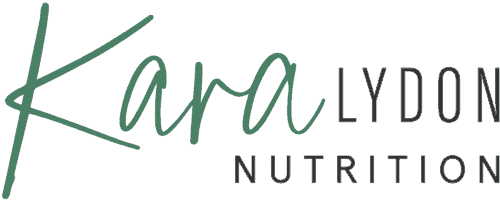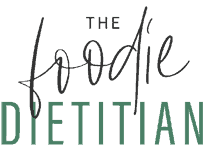What is orthorexia? We’re uncovering this form of disordered eating that is characterized by when healthy eating becomes obsessive.

Hey, hey friends! I’m excited to introduce you today to my intern, Hannah. She’s been BTS here at TFD since July helping out with non-diet and intuitive eating content creation. Hannah just wrapped up her nutrition coursework and is heading to Korea in a week to live there and teach English! How cool is that?! I’m so excited for her to be here on the blog today talking about an important topic that comes up a lot in today’s health-obsessed culture and that is orthorexia. There’s a lot of confusion around when healthy eating is just healthy eating and when it crosses the line into disordered territory. Hannah is here to dive deep into the topic and unpack it further. We hope this post is helpful! Take it away, Hannah!
There’s no denying that it can be beneficial to eat nutritious foods and focus on health, but in today’s society ridden with diet culture messaging, even the pursuit of health can be taken to the extreme. With wellness culture constantly evolving and selling the same diet in different packaging, if taken too far, well-intentioned diet efforts can morph into orthorexia.
So what does this mean? How do you know if you’re being healthy or obsessive? This post will dive into what orthorexia is, some warning signs, and how to navigate healthy eating without obsession.
What is Orthorexia?
Orthorexia nervosa is a form of disordered eating in which one becomes obsessed with healthy eating and/or the pursuit of a “perfect” diet. Though it is not a formally recognized eating disorder in the DSM, the term “orthorexia” was coined by Steven Bratman, M.D. in 1996 and has gained more attention in recent years with the rise of certain diet trends including “clean eating,” “paleo,” “keto,” plant-based veganism, and more. On the topic of orthorexia, Bratman states, “It is this transference of all life’s value into the act of eating which makes orthorexia a true disorder.
In this essential characteristic, orthorexia bears many similarities to the two named eating disorders: anorexia and bulimia. Whereas the bulimic and anorexic focus on the quantity of food, the orthorexic fixates on its quality. All three give to food a vastly excessive place in the scheme of life.” Since orthorexia is not currently recognized as a formal eating disorder, it is difficult to estimate precisely how many people suffer with it. Quite often, orthorexic tendencies are associated with anxiety disorders that are commonly seen in those with anorexia nervosa, bulimia nervosa, binge-eating disorder, and other unspecified eating disorders.
How Do You Know if You Have Orthorexia?
Since diet culture upholds eating disorder behaviors as something to be celebrated, it can oftentimes be difficult to point out warning signs and symptoms of eating disorders—this is especially true for orthorexia. In my own personal battle with obsessive health, my intense fixation on eating “clean” was not only normalized, but encouraged; I had an entire community on Instagram rooting for me and dubbing my rigidly narrow diet “inspiring.”
My friends praised me for my “self-control” and for always being the “healthy one” of the group. Little did they know that internally, I was anything but healthy. My brain was constantly occupied with thoughts and calculations around food and worries about consuming too much of certain foods. In my rigid pursuit of physical health, I actually became increasingly more unhealthy and was unable to see it as a problem until I was on the other side of it.
Have you ever looked at the menu for a restaurant before going to ensure that they offer something you’re “allowed” to eat? Does eating in a specific way give you a feeling of moral superiority or spiritual satisfaction? Do you avoid social situations or gatherings for fear of not being able to eat certain foods that you deem safe? Do you spend hours per day consuming wellness culture on Instagram? These are just a few examples of orthorexic tendencies, but can also include:
- Judging others who eat in a different or “less healthful” way than you and basing character off of food choices.
- Feeling intensely guilty for eating anything outside of what is deemed healthy or allowed.
- Feelings of fear associated with consuming processed foods or certain ingredients that are deemed unhealthy.
- Distancing self from family members and friends to avoid social situations that could compromise eating patterns.
- Obsessive engagement in spheres of social media surrounding healthy lifestyle blogging.
- Cutting out entire food groups such as dairy, animal products, carbs or sugar, fat, etc.
- Meticulously planning meals and snacks in advance and/or a constant fixation on food.
- Unusual interest in the health or lack thereof of the food others are consuming.

Oftentimes, orthorexia serves as a more socially acceptable form of disordered eating and can act as an intermediary step for those in eating disorder recovery. In my own experience, the meticulous restriction of calories was traded in for avoidance of certain food groups for “health’s” sake.
Rather than counting calories, I dissected food labels and counted nutrients to ensure I was getting the “perfect” amount of vitamins and minerals per day. I would spend hours on end consuming wellness bloggers’ content and planning out my meals for the next few days, ensuring they were my version of perfect. If any social events came up, I would constantly be thinking about the food being served and how I would navigate being around things I wouldn’t allow myself to eat. It was exhausting.
I proclaimed to be in recovery from my eating disorder, and perhaps I was, but I failed to realize that it had simply morphed into orthorexia. There was a part of me that wasn’t 100% ready to let go of my eating disorder as a coping mechanism; it felt safe, it kept me in a bubble, and allowed me to tune out from anything truly difficult that I didn’t want to engage with. Orthorexia allowed me to continue my eating disorder in a more socially acceptable way that would never be called out. After all, I was just the “healthy one,” right?
Orthorexia Vs. Healthy Eating:
All that to say, there is nothing intrinsically wrong with the pursuit of health. There is certainly a way to go about eating healthfully without bordering orthorexia, but it can be difficult to navigate for people who have a past history of disordered eating or an eating disorder. Working with a dietitian and/or therapist trained in eating disorders can be incredibly helpful in cultivating a healthy relationship to food and perhaps working towards eating intuitively.
The final principle of intuitive eating is gentle nutrition—this principle seeks to honor health in a manner that feels nourishing and flexible. This can include choosing foods that give you energy, opting for more nutritious foods such as whole grains in place of refined, and eating a variety of fruits and vegetables to provide the body with important vitamins and minerals. Gentle nutrition looks different on everyone and there is no one-size-fits-all approach, but it can be helpful to approach healthy eating with a mindset of body respect and curiosity rather than rigidity.
Healthy eating is approached from a lens of self-care versus self-control. It involves zooming out and looking at the bigger picture when it comes to nutrition and health. Rather than getting caught up in the minutiae of how many calories or grams of XYZ did I have today, zoom out and ask yourself over the course of the last week, did I have a wide variety of foods and nutrients?

While orthorexia fosters an all-or-nothing mindset, healthy eating has the ability to be flexible and adaptable. This comes with the understanding that one food or eating experience will not make or break your health and that all foods have some nutritional value.
Healthy eating (and gentle nutrition) is approached with an abundance versus scarcity mindset. Rather than cutting out foods, think about what foods you can add to an eating experience that will help you feel good, both physically and mentally. Of course, the approach to healthy eating will shift day-to-day based on differing needs and cravings. But the most important thing is to retain a sense of curiosity, flexibility, and adaptability while learning to embrace wellness without the obsession.
Bottom Line
There is nothing wrong with choosing more nutritious foods over less nutrient-dense ones for health reasons, but the issue arises when these choices begin to dictate one’s life. If the pursuit of health causes you distress and anxiety, it is no longer a healthy pursuit. If you notice yourself becoming obsessive about your diet, avoiding social events, or constantly fixating on food and health, it may be time to seek out the support you deserve in healing your relationship to food.

Was this post helpful? Tell us your thoughts in the comments below!

Hannah is a recent graduate from Virginia Commonwealth University in Richmond, Virginia with degrees in Health Science and English. She is moving to South Korea to teach English for the next year before pursuing a career in dietetics. With a passion for Health at Every Size and intuitive eating, Hannah seeks to dismantle diet culture and fatphobia by advocating for body inclusivity and weight-neutral care. When she’s not engaging with the non-diet world, she enjoys yoga, live music, traveling, and spending time outside.
You May Also like
For more inspo’ to lead an intuitive life, check out my posts below!





What a wonderful post, you have put quite a lot of effort into this one, I can tell. Love everything about this, great post. Hope to see more such posts from you soon.
Thanks for the kind words!